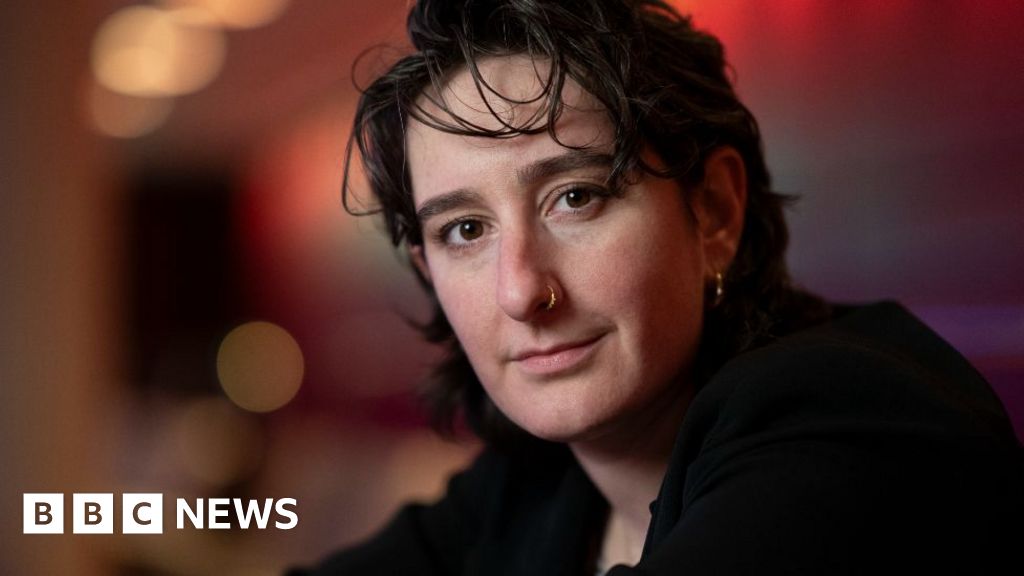ARTICLE AD BOX

Signs at Manchester's Palace theatre ask audience members not to sing along during The Bodyguard
By Ian Youngs
Entertainment & arts reporter
Should you be allowed to sing along at a musical? After unwanted crowd participation led to The Bodyguard being cut short and police being called, the issue of audience behaviour - especially since the pandemic - has been thrust into the spotlight.
"Please refrain from singing along."
Those words greet audiences on posters on the doors of Manchester's Palace Theatre, and inside the foyers.
Singing along at a musical might not sound like a big issue. It's often part of the fun.
But on Friday, one overenthusiastic audience member's backing vocals during the big climax of I Will Always Love You led to a row, a scuffle - and a news story that blew up.
"If people had spoiled it for everyone else, I would have been absolutely devastated," said Zoe from Burnley, on her way in to see the show the next night.
"I will be singing - but low key," she added.
There is a difference between a theatre show and a concert, she said. "It's a musical and you're there to hear the lyrics, hear the words, emotions, everything.
"It's not a gig where you're standing on chairs and things like that. You're here to feel the emotions of The Bodyguard, and that's what I'm here for."
Melody Thornton could not finish I Will Always Love You as some fans were loudly singing
Other audience members on Saturday also said they liked to sing - up to a point.
"I don't see what's wrong with singing along to some degree," said Anna from Hyde in Greater Manchester.
"But if it's the rules then you've got to follow the rules... When drink's involved, it can get a bit annoying."
Amanda from Burnley said: "We've been to quite a few [shows] and we've sung - but not wanting to do a solo or anything like that. You wouldn't stand up and stand out from the crowd."
Husband Simon added: "If other people around you are doing it, you just join in, don't you? There are Tina Turner and Abba musicals where everyone's singing, so it's part of it sometimes."
Image source, Getty Images
Image caption,The Bodyguard musical includes lots of Whitney Houston's hits
The Bodyguard is adapted from the 1992 film starring Whitney Houston and Kevin Costner, and the musical version, starring Pussycat Doll Melody Thornton, features many other Whitney hits.
It's an often tender and tense love story, rather than a raucous sing-a-long. The foyer posters show there have been issues before.
And not just in Manchester - a previous venue on the tour, the King's Theatre in Glasgow, asked patrons to ensure "the professionals on stage are the only people entertaining us with their performances".
Host Alison Hammond said she would be "devastated" if she wasn't allowed to sing along. "I'm not even going to go to that show now," she said.
Vanessa Feltz added: "Isn't the whole point of going to a musical that you know, that you sing along to all the bits you know... very, very loudly while eating an ice cream."
Co-presenter Dermot O'Leary reasoned: "Here's the thing. There's singing along, and there's singing along, right? No-one minds someone next to you just singing the words to themself.
"[If] I've paid money to see Pussycat Doll member Melody Thornton, I would not want someone, like with a cat's chorus next to me, drowning her out."
He was dismissed as "a bit spoilsporty" by Feltz, who - along with Hammond - has since felt the ire of theatre Twitter.
This Twitter post cannot be displayed in your browser. Please enable Javascript or try a different browser.View original tweet on Twitter
The BBC is not responsible for the content of external sites.
This Twitter post cannot be displayed in your browser. Please enable Javascript or try a different browser.View original tweet on Twitter
The BBC is not responsible for the content of external sites.
But this is not just about singing.
One person who identified themselves on Twitter as a Palace front of house supervisor wrote: "The police were not called because of a few patrons singing along, they were called because of the UNPRECEDENTED levels of VIOLENCE asking them to stop caused."
Bad audience behaviour in general has become an increasing problem, according to many performers and theatre workers.
Actor Charles Brunton told BBC Breakfast: "It's been really [worse] since the pandemic, since theatres have reopened up. It seems to be on a weekly basis [that] I hear a horror story of some instance and an audience member going crazy, or some situation that disrupts the performance on stage.
"Pre-pandemic, it was pretty rare that instances would happen. In lockdown, we were sat watching television shows or theatres' productions that were put on television, and obviously we were doing that in our lounge. We could chat away, we could argue, we could fight, we could do what we like. And people seem to have brought that into the theatre."
Chinese food in the front row
We could also look at our phones or eat takeaways.
"It really does affect you," actor Kieran Brown told BBC Radio 5 Live. "It's not even just singing along and chatting and stuff. I've heard other stories about people pulling out Chinese takeaways in the front row, or McDonald's.
"It's so disheartening to look down and see someone's face lit up by a telephone, or just see people chatting or walking in and out," he continued. "You're so easily distracted as a performer, and we've got a lot to think about."
Last week, entertainment union Bectu launched a campaign to tackle anti-social behaviour in theatres after a survey suggested a large number of members had encountered problems including assault, aggression, racial slurs and mass brawls.
Image source, Getty Images
Image caption,Two audience members were charged over a disturbance during Jersey Boys at the Edinburgh Playhouse
In February, the boss of the Edinburgh Playhouse said its staff were "nervous and scared" after incidents including one disturbance in which a worker was allegedly punched during the musical Jersey Boys.
And the manager of the Princes Theatre in Clacton, Essex, said he was considering conflict management training for staff because of an increase in "rowdy and potty-mouthed" audience members.
Brown said he thought much bad behaviour was fuelled by alcohol. "Our front of house staff are there for your comfort and safety," he said.
"They go to work not to be threatened with violence. They don't get paid enough to deal with drunken punters and be threatened to be thrown over the edge of the balcony, as I've heard has happened.
"I believe a lot of the trouble's not come necessarily from people singing, but the reaction when they have been asked to stop singing. That's when they start to get violent."
Performers have pointed out that fans are often encouraged to sing along - but usually only at the end, during a finale when the cast members ask the crowd to get on their feet.
At The Bodyguard, that happens when the cast gather to deliver one last performance of I Wanna Dance With Somebody. Or at least, it normally does.
On Friday, the show was ended before most of the audience had the chance to join in.

 2 years ago
49
2 years ago
49








 English (US) ·
English (US) ·